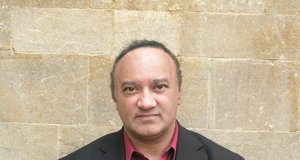Dr Shabbir Akhtar, a prominent Muslim intellectual who moved from Pakistan to Bradford, a well-known poet and philosopher, breathed his last in Oxford on 26 July at the age of 63. Working for the community, Dr Shabbir left behind a lasting legacy of combating Islamophobia and striving a balance between freedom of expression and blasphemy. He gradually became a voice for minority Muslims in the UK.
Despite his significant contributions, his work wasn’t discussed as extensively as it should have been.
Dr Akhtar moved from Pakistan to Bradford at the age of eight with his parents and siblings. His father worked as a bus driver in the city. He attended Belle Vue Boys Comprehensive School before going on to study philosophy at St Catherine’s College, Cambridge in 1980.
He graduated with a first-class degree and was a student of the Catholic philosopher Elisabeth Anscombe, one of the literary inheritors of Wittgenstein. After studying philosophy (BA and MA degrees) at Cambridge, he went to the University of Calgary, Alberta in Canada for his PhD in the philosophy of religion, with his thesis titled “Religion in the Age of Reason: Faith and the Apostasy of Humanism.”
After completing his studies, Dr Shabbir returned to Bradford and joined our team at the Bradford Racial Equality Council as the Racial Equality Officer (Education). For a short period, he also worked as a community librarian at the Pakistani Community Centre as part of a team that included Yaqub Nizami.
The acclaimed intellectual rose to prominence when he passionately criticised Salman Rushdie’s book, ‘The Satanic Verses’, published in 1988.
Salman Rushdie’s controversy centred around his novel “The Satanic Verses,” which some Muslims deemed blasphemous. They accused Rushdie of insulting Islam’s Prophet Muhammad. The Ayatollah Khomeini of Iran issued a fatwa, calling for Rushdie’s death. This sparked global debates on free speech and religion, while Rushdie lived in hiding for years.
The incident highlighted tensions between artistic expression and religious sensitivities, shaping discussions on cultural clashes and freedom of expression.
Critiquing Rushdie, Dr Akhtar published two books: ‘Be Careful with Mohammad!’ in 1989 and ‘The Light to Entitlement’ in 1990.
In the book ‘Be Careful with Mohammed!’, Dr Akhtar claimed, “There is no choice in the matter. Anyone who fails to be offended by Rushdie’s book ipso facto ceases to be a Muslim”.
As per a New York Times article dated 22 July 1990, Dr Shabbir was “the most articulate of Mr. Rushdie’s Muslim opponents in Britain.”
He became a national figure across the UK as the spokesperson of the Bradford Council of Muslims, using this role to defend the Muslim viewpoint in the media during the Rushdie affair. On television, he debated with the likes of Ian McEwan, Melvyn Bragg, and Michael Ignatieff.
In 2020, he published a second edition of ‘Be Careful with Mohammad!’, where he tried to strike a balance between free speech and incidents of blasphemy. He argued that freedom of speech is not absolute and should avoid insulting God or His messenger.
Apart from this, Dr Shabbir has published widely on pluralism, political Islam, Islamophobia, extremism, and interfaith dialogue, as well as on Islam and Christianity’s differing responses to the challenges of modernity. He has authored a plethora of books, including ‘The New Testament in Muslim Eyes: Paul’s Letter to the Galatians’, ‘The Quran and the Secular Mind: A Philosophy of Islam’, and ‘The Quran and the Secular Mind: A Philosophy of Islam’, to name a few. The author also has three volumes of English poetry to his name.
He also has experience teaching at universities in the UK, USA, and Malaysia.
Dr Shabbir also played a role as a research fellow with the Centre for Muslim and Christian Studies of Oxford University from 2013 to 2018. He contributed immensely to the centre’s series ‘Reading the Bible in the Context of Islam’ as an editor.
Numerous tributes from around the UK poured in when Dr Shabbir breathed his last.
Dr Atif Imtiaz, a close friend of Dr Shabbir Akhtar, remarked, “He was one of the brightest of his generation of British Muslims.” Mohammed Ajeeb CBE, the former Lord Mayor of Bradford, commented, “Bradford and British Muslims have lost a great ambassador”.
Nadim Qureshi, also a close friend who had known Shabbir from their time at Belle Vue Boys School, said, “Whilst Bradford may mourn the loss of one of its brightest lights, I have lost a dear friend who shared his more human side away from academia”.
Yaqub Nizami, the author of ‘Pakistan to England’, said, “I had the privilege of being Dr Shabbir’s work colleague. His intellect and sharp wit set him apart and above others in the team.”
Liaqat Hussain Naushahi of Jamiyiate Tabligh ul Islam and the former Secretary General and President of the Bradford Council for Mosques observed, “Dr Shabbir was a person of faith who served it with passion through his writings, leaving a legacy that we can be proud of.”
Ishtiaq Ahmed, another friend of Dr Shabbir, wrote: “For me personally, the loss is compounded by the departure of a truly dear friend and an intellectual inspiration. Over the years, we enjoyed many intellectual excursions together. He always brought wit and humour even to the dimmest of circumstances.”
In a message, Dr Akhtar’s wife Fouziea wrote: “Shabbir was such a wonderful, loving, caring, supportive father, husband, scholar, poet, and friend who touched everyone’s heart and often put a smile on our faces with his witty sense of humour. He will truly be missed.”




